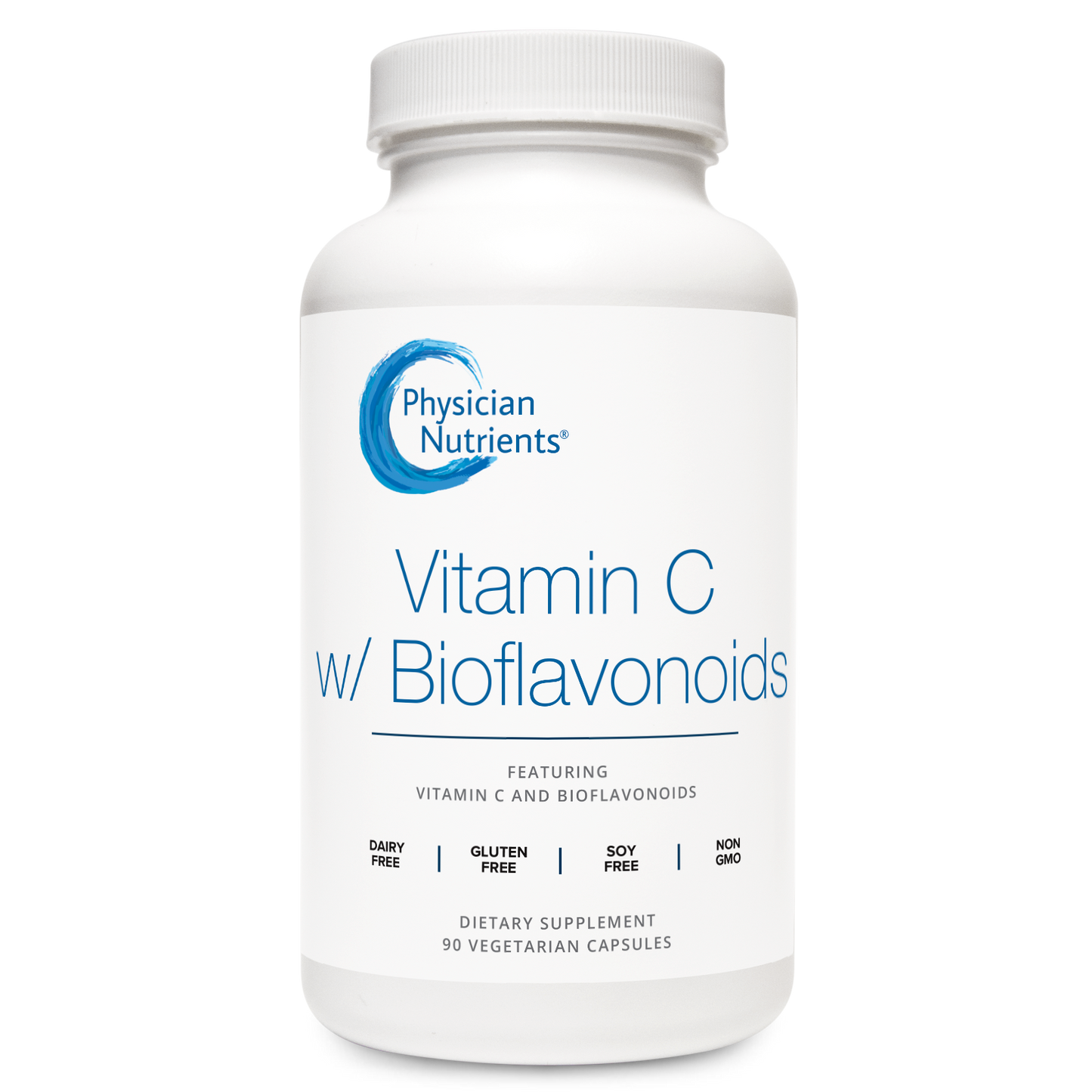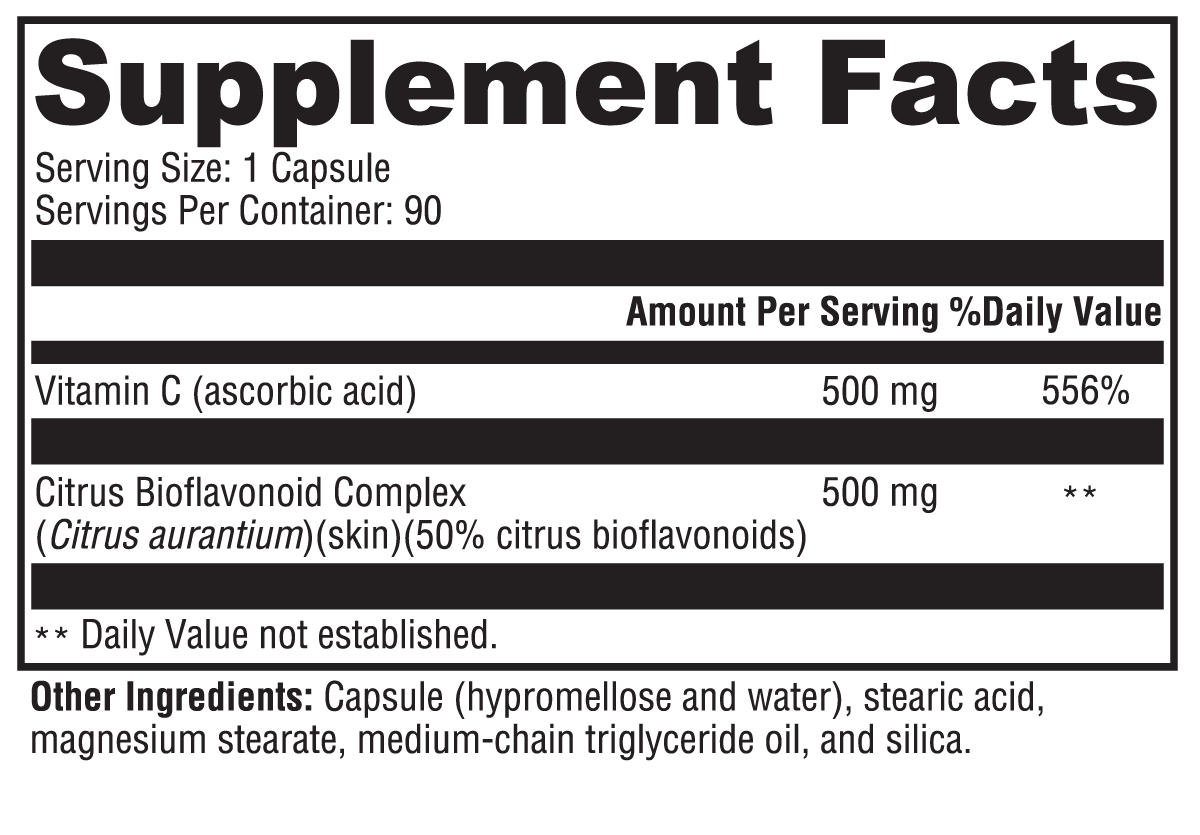Vitamin C with Bioflavonoids
Vitamin C with Bioflavonoids
Couldn't load pickup availability
Vitamin C with Bioflavonoids combines high-potency vitamin C with a standardized, full-spectrum, citrus bioflavonoid complex. Both vitamin C and bioflavonoids have been extensively researched for their roles in supporting antioxidant and immune function. In addition, research indicates that vitamin C is required for the synthesis of collagen, neurotransmitters, and carnitine. Bioflavonoids appear to support healthy metabolism and cognition by functioning as cell-signaling agents.
*These statements have not been evaluated by the Food and Drug Administration. These products are not intended to diagnose, treat, cure, or prevent any disease.
Details
90 Vegetable Capsules
Applications:
Antioxidant support*
Healthy Connective Tissue and Blood Vessel Synthesis*
Support of Normal Immune System Function*
Synthesis of Carnitine, Neurotransmitters, and Collagen*
Directions: Take one capsule daily, or as directed by your healthcare practitioner.
Consult your healthcare practitioner prior to use. Do not use if tamper seal is damaged.
Does Not Contain: Wheat, gluten, yeast, soy, animal or dairy products, fish, shellfish, peanuts, tree nuts, egg, artificial colors, artificial sweeteners, or preservatives.
*These statements have not been evaluated by the Food and Drug Administration. These products are not intended to diagnose, treat, cure, or prevent any disease.
Supportive Science
Vitamin C w/ Bioflavonoids is formulated to provide antioxidant protection, enhance immune function, and support synthesis and function of collagen, carnitine, and neurotransmitters. Each capsule of Vitamin C w/ Bioflavonoids provides 500 mg of vitamin C and 500 mg of citrus bioflavonoid complex in a one-to-one ratio.*
Vitamin C (ascorbic acid) is a water-soluble antioxidant vitamin that is essential to humans. While most mammals are able to synthesize vitamin C, humans must obtain it exogenously. Stress, smoking, pollution, radiation and heavy metal exposure, immune challenge, and temperature change all increase the human requirement for vitamin C. Well-known functions of this ubiquitous vitamin include antioxidant protection from free radicals and oxidative processes; synthesis of collagen, carnitine, and neurotransmitters; adrenal support; and immune stimulation and support. Vitamin C serves as a cofactor for several metabolic enzymes, including hydroxylase and oxygenase (hydroxylation reactions).*
Vitamin C has long been recognized for its contribution to immune support. Immune cells absorb and concentrate vitamin C. Immune cell activity, particularly T-cell function and phagocytosis, is found to be enhanced by this essential vitamin. In early 1972, a randomized, double-blind, placebo-controlled study of 1000 subjects taking 1000 mg of vitamin C per day provided support for the use of vitamin C supplementation for common immune challenges. The study results revealed that the supplementation group missed significantly fewer days from work/activities and had fewer days per episode of immune challenge; in addition, significantly more subjects taking vitamin C remained symptom free throughout the study. Optimal intake of vitamin C for humans continues to be debated, though normal vitamin C synthesis in mammals such as the rat is calculated to be 26-58 mg/kg/day. Dr. Linus Pauling, in his 1970 article on evolution and vitamin C requirements, recommended a minimum intake of 2300 mg per 2500 kilocalorie intake per day for humans.*
Vitamin C has far-reaching effects on a number of tissues in the body because it is required for the synthesis of collagen. Collagen is a fundamental component of bones, tendons, ligaments, blood vessels, skin, gums, and joints. Ultimately, the health of these tissues depends on vitamin C. Energy generation from fatty acids is vitamin C-dependent as well since synthesis of carnitine (the molecule that shuttles long-chain fatty acids into the mitochondria) requires this versatile vitamin.
Vitamin C is maintained in relatively high concentrations in the brain; it is essential to maintaining healthy mood and brain function because it facilitates conversion of dopamine to norepinephrine and enhances interneuronal communication.*
Bioflavonoids (also known as flavonoids) are phytochemicals that are often found together with vitamin C in nature and are generally considered to be among the most important and interesting classes of biologically active compounds in contemporary research. More than 4000 bioflavonoids have been identified. Intake of flavonoids is associated with healthy cardiovascular status, the body’s normal response to inflammation, and positive microbial balance.*
Citrus bioflavonoids are commonly used in Europe for blood vessel and lymph system support. US practitioners utilize bioflavonoids in protocols to support tissue and joint comfort and the body’s normal response to inflammation, respiratory and eye health, and maintenance of cardiovascular health. Citrus bioflavonoids are able to cross the blood-brain barrier and have been recognized for their neuroprotective effects. As cell-signaling agents, bioflavonoids are believed to support healthy cell growth and normal cell-life regulation, stimulate detoxification enzymes, decrease vascular cell adhesion molecules, increase vasodilation, and support healthy platelet function.*
The combination of vitamin C and citrus bioflavonoids in Vitamin C w/ Bioflavonoids ensures that a wide range of metabolic functions will be supported.*
*These statements have not been evaluated by the Food and Drug Administration. These products are not intended to diagnose, treat, cure, or prevent any disease.
Share




